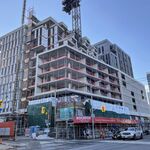Is this really a bubble? I really don't think so.
I just read through this thread, and find a lot of the opinions interesting! And there are other perspectives to take into account on the Toronto real estate market, that include geopolitical factors and economic factors. Someone mentioned the immigration factor and couples moving into the city as well.
Both those factors contribute to the growth of the Toronto condo market. More specifically Chinese immigration. The condo footprint that is tolerable by immigrants from Asia is much smaller than what a lot of us would consider livable. If anyone has been to Hong Kong and been into some of the upper end Condo's you would notice that they are very small. Not to mention the population per square foot in the region is much higher. That demographic from both China and its little Hong Kong province has been driving the Toronto condo market for quite a while. If a developer then realizes that he can double his units and use a smaller building footprint, and keep the price the same, and he will have clients lining up out the door, It only makes sense that he does it. Hong Kong is not the only place. Living in London UK you will find the same thing within the city, but at double the rates we pay here, Paris is also much the same, as is Berlin,
Further when the local population wants to move into the city and realizes that some of those smaller world war 2 houses that were built along all the one way streets are out of reach because they are getting $500,000.00+ for them, and then they look at a new condo, sitting near the water, or near the Skydome, ACC, or other very convenient areas, it just makes more sense to get into a small 2 bedroom for $300K. First time buyers cant afford the small home anymore in Toronto. They have to go to the condo, and when you consider what I mentioned above about the trend being set by developers and asian appetite, you have this sector of the population also jockeying for spaces in these new buildings.
The other thing is the recent credit collapse in the US and how it has effected other markets. The real estate market has almost completely imploded, everything has slowed down and people cannot get mortgages, jobs are being lost etc. A lot of overseas investors from Asia, and Europe, and the Middle East North Africa Region are not comfortable with the US market. This, coupled with the fact that Canada came out relatively unscathed in the whole debacle, creates a very attractive market for people investing. Further when you compare the price per sq/ft and realize that you can get into a new project off the plans at about $450 a foot, and know that it will increase in price because the projects tend to sell out quickly, it makes perfect sense to buy. I was involved in a project down in Liberty Village a while back for an investor client, and the building sold out the day of public opening. Toronto's condo market is unique, in that it is still somewhat undervalued for a large metropolitan city. We have green space, we have a good banking system that is stable, and the country's reputation as a good place to come live is contributing to the boom.
Some people say oh the developers are driving the market and that this so called bubble has got to do with them, or that there are too many real estate agents and that is driving the market and creating this percieved bubble. In reality Builders/Developers/Agents only stay in the sector and start new projects if they can see a profit in it.
Nobody is going to be silly enough to invest 5+ years and millions of dollars assembling the land, getting the zoning and permits, borrowing money from the banks and creditors if there is no market for the condos. These are businessmen that intimately understand the risks involved and how to calculate them. Yes companies like Lehmans took a bath, and a few projects got stalled, and the reality is that they are back on the go, and the buyers are lined up around the block with deposit cheques. The issue stalling a lot of these projects out was the lack of1st and 2nd round finance! not the end buyers!
It is true Toronto did stall out in 2008/09 for a little bit, but not because it was our economy going into the toilet. It was the buyers and sellers fear about the market down south and how it may effect us. Well the effect never happened and people started breathing again, and started buying again.
Our credit market DID tighten up, and now a lot of people who could have gotten a home with a lower beacon score, cannot any longer, this sector them become potential renters, who still want to move into the city. So investment has become more attractive to those that have access to capital. (remember we are a global economy now and so we cannot just look at local GDP as an indicator of financial viability for the population) Those people are more often foreign investors or first time buyers, looking for a condo, that have kept their credit immaculate.
So all these people going on about the bubble should consider all the factors. Yes we may end up with a dip, or a slowdown, etc, but as long as we still seem attractive to the foreign immigrant investor, our country has a good reputation, our banking system remains responsible, and our square footage prices remain below world market value, I think its going to stay vibrant, and there is opportunity to make money.
I personally advise my clients in this regard. Believe me, I would not referring them to a developer to buy up a few units as an investment, if I thought they were going to lose money. My relationship with my clients, who happen to be high-net-worth and Ultra-high-net-worth clients is far too important to me. Further, I advise them to consider these investments on a long hold view, with possibilities of rental income based on what was mentioned above.
In essence the Toronto Market is not a bubble! the bubble is south of the border, and it popped over a year ago!
PS check out a good friend of ours who is considered a Toronto Condo Market Guru and developer to see what he says!
[video=youtube;77bYVWerTvw]http://www.youtube.com/watch?v=77bYVWerTvw[/video]
If you are a foreign investor and looking for advice on how to move into the Canadian Market, looking to immigrate, or need advice on handling family assets, let me know. We can help.
Cheers
Ron Janjua MSc. JD
Director of Global Business Development
Pace Global Advantage
www.paceglobaladvantage.com/pga/partners.php



